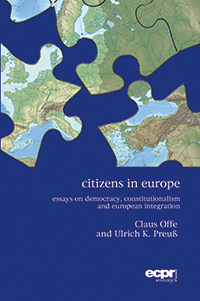Davies, Howard, (2016), “Taking Monetary Policy to the People”, Project Syndicate, 25 October For the last 20 years, central-bank independence has marked a kind of “end of history” for monetary policy, after many other regimes were tried and failed. In the years before the 2008 global financial crisis, independent central banks were seen as successful in controlling inflation; and countries with sizable fiscal deficits were especially enthusiastic about central-bank independence …Read More
Should we rethink fiscal policy?
Merler, Silvia, (2016), “Should we rethink fiscal policy?”, Bruegel, 24 October What’s at stake: there has been quite some discussion recently on whether we should rethink the framework of fiscal policy in order to make it more appropriate and effective in a world where demand seems to be chronically anemic, inflation is low and the interest rates are likely to stay close to zero (if not negative) for a long …Read More
Accessing sovereign markets – the recent experiences of Ireland, Portugal, Spain, and Cyprus
Strauch, Rolf, Rojas, Juan, O’Connor, Frank, Casalinho, Cristina, de Ramón-Laca Clausen, Pablo, Kalozois, Phaedon, (2016), “Accessing sovereign markets – the recent experiences of Ireland, Portugal, Spain, and Cyprus“, ESM Discussion Paper Series, June Every European government needs market access. It needs to be able to finance itself at affordable prices on financial markets. To most, market access seems unproblematic and is normally taken for granted. The daily work of Debt Management Offices …Read More
Citizens in Europe: Essays on Democracy, Constitutionalism and European Integration
Offe, Claus, K. Preuß, Ulrich, (2016), “Citizens in Europe: Essays on Democracy, Constitutionalism and European Integration”, ECPR Press, March This interdisciplinary collection of essays by a constitutionalist and a political sociologist examines how fragmented societies can be held together by appropriate and effective constitutional arrangements providing for bonds of democratic citizenship. Exploring the political order dilemmas of capitalist democracies, the authors address moral and institutional prerequisites on which the deepening of European …Read More
Breaking the vicious circle
Véron, Nicolas, (2016), “Breaking the vicious circle”, Bruegel, 21 October The eurozone’s banking union has moved from vision to reality in a short period of time, with the European Central Bank now an established supervisory authority for the area’s large banks. This has already made a big difference to the many national banking champions that local supervisors had been treating with kid gloves. But the banking union’s ultimate policy goal, …Read More
Forecasting GDP during and after the Great Recession
Ollivaud, Patrice, Pionnier, Pierre-Alain, Rusticelli, Elena, Schwellnus, Cyrille, Koh, Seung-Hee, (2016), “Forecasting GDP during and after the Great Recession”, OECD Economics Department Working Papers No. 1313, 26 July This paper compares the short-term forecasting performance of state-of-the-art large-scale dynamic factor models (DFMs) and the small-scale bridge models routinely used at the OECD. Pseudoreal time out-of-sample forecasts for France, Germany, Italy, Japan, United Kingdom and the United States during and after the Great Recession …Read More
Society at a Glance 2016 – OECD Social Indicators
OECD, (2016), “Society at a Glance 2016 – OECD Social Indicators”, OECD Publishing, 5 October This is the eighth edition of Society at a Glance, the biennial OECD overview of social indicators. This report addresses the growing demand for quantitative evidence on social well-being and its trends. It updates some indicators included in the previous editions published since 2001 and introduces several new ones, with 25 indicators in total. It includes …Read More
How to deal with the Resolution of Financial Market Infrastructures
Huertas, Thomas, (2016), “How to deal with the Resolution of Financial Market Infrastructures”, CEPS Series: Task Force Report, 19 October This new interim report by the CEPS Task Force on Implementing Financial Sector Resolution welcomes international efforts to devise guidelines to ensure that FMIs are resolvable, i.e. acknowledging that any FMI can fail, but if an FMI fails, critical operations will continue to be performed. The report argues that European rules in …Read More
A Progressive Political Alliance for Europe
Derviş, Kemal, (2016), “A Progressive Political Alliance for Europe”, Project Syndicate, 20 October In less than three weeks, we will know who will be the next president of the United States. What kind of partner that president finds in Europe will depend substantially on the outcome of two elections in 2017: France’s presidential election in early May and Germany’s federal election by the end of October. Of course, the United Kingdom’s …Read More
Income distribution and aggregate saving: New evidence
Bofinger, Peter,Scheuermeyer, Philipp, (2016), “Income distribution and aggregate saving: New evidence”, VoxEu, 20 October The effect of income distribution on aggregate saving has important implications for aggregate demand and global current account imbalances. Drawing on evidence from a panel of high-income OECD countries, this column documents a hump-shaped relationship between inequality and aggregate saving rates. It also shows that the relationship between inequality and saving depends on financial market conditions. …Read More






